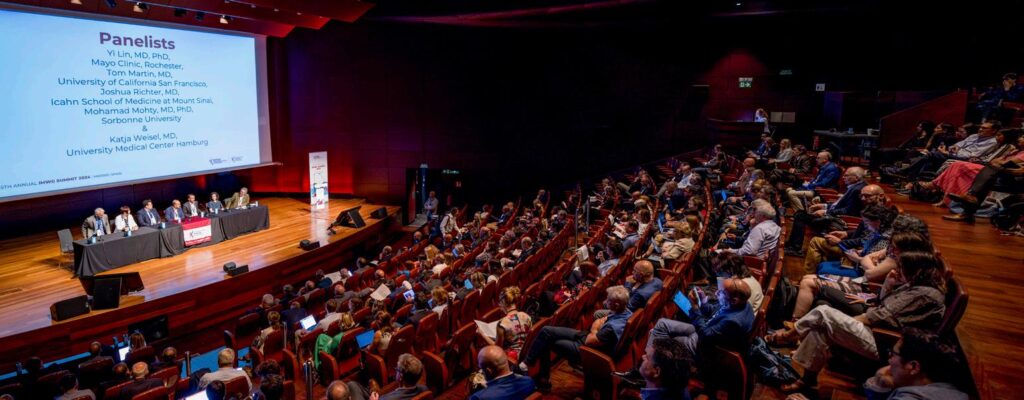As the 7th Annual Summit of the Asian Myeloma Network (AMN) concluded in Bangkok on Sunday, October 22nd, it became clear that the progress made in Asia extends far beyond the region itself.
This year’s summit brought significant benefits, including insights from the 3rd Doctor Masterclass Program, the 3rd Patient Forum, and the 7th Scientific Summit, where myeloma experts from across Asia gathered. The success of the event was made possible by the efforts of the AMN Executive Staff, led by IMF Senior Vice President of Global Affairs Daniel Navid and Executive Vice President of Medical Affairs Lisa Paik, along with the entire IMF Meetings Team, headed by Senior Director of Program Operations & Chief of Staff Annabel Reardon. It truly takes a global team to orchestrate an event like the AMN Summit.
The lessons learned at the summit apply not only to Asia but also to myeloma patients, experts, and healthcare professionals worldwide, from North America and Europe to the Middle East and Latin America.
Finding a cure for myeloma is a global challenge, and the lack of access to essential tests and treatments affects patients everywhere. Local advancements, like those seen in Asia, can drive global progress with the support of the IMF’s extensive reach and the global research platform provided by the Black Swan Research Initiative (BSRI).
The 7th Annual Summit: Key Impacts
The summit began with an exceptional keynote lecture from Bruno Paiva, PharmD, PhD, co-director of the Flow Cytometry Platform and Monoclonal Gammopathies Research Laboratory at CIMA Universidad De Navarra, Spain. Dr. Paiva, a key member of i2TEAMM, discussed the FDA and EMA approval process for using minimal residual disease (MRD) testing as a response endpoint in myeloma clinical trials.
Dr. Paiva’s Keynote: From Bench to Bedside
In his lecture, Dr. Paiva focused on immunogenomic research and the practical monitoring of MRD and immune status throughout the disease course. He introduced the BloodFlow method for measuring MRD levels in blood and Mass Spectrometry for accurately measuring low levels of myeloma protein, both of which have great potential for precise assessment.
One key takeaway was the prognostic importance of circulating myeloma cells, which reflect active disease or relapse. The discussion explored the feasibility of implementing such testing in Asia and globally.
Open Session Highlights
The first morning session covered topics like Cure versus Control, Immune Therapies, MRD, New Therapies in Development, and Smoldering Myeloma, including insights from the iStopMM project in Iceland. Myeloma experts from across Asia and around the world participated, leading to an engaging and lively discussion.
Key questions included whether new tests and treatments are available and feasible in Asia, and what the broader takeaways for AMN’s future work might be.
Working Group Reports
Answers to these questions were addressed in the Working Group Reports, where active participation and actionable steps were a highlight. Topics included Infection, Bone Imaging, Smoldering Myeloma, and other Plasma Cell Disorders.
Action items ranged from establishing a registry to track infections (especially in the context of new immune therapies), to creating imaging guidelines and reviewing diagnostic criteria for smoldering myeloma in Asia. The feasibility of CAR T-cell therapies and supportive care costs were also key discussion points.
Dr. Kazuyuki Shimizu: Honoring a Myeloma Pioneer
On October 21, the IMF hosted the first-ever Asian Myeloma Network Distinguished Service Award ceremony, where I had the honor of presenting the award to Dr. Kazuyuki Shimizu, a pioneering hemato-oncologist and longtime member of the International Myeloma Working Group.
Dr. Shimizu expressed his gratitude for being recognized for his contributions to myeloma research and patient care. The award celebrates those who have made a significant impact in advancing myeloma research and treatment.
AMN Clinical Trials and Research Projects
Prof. Wee Joo Chng, Chairman of the AMN Clinical Trials Group, provided an encouraging update on the status of trials and new research projects. Over five trials are in progress, with several more in development, marking a significant success for both researchers and patients.
The AMN’s ongoing pilot study for the International Myeloma Working Group’s (IMWG) global Biobank is another major milestone. This biobank allows for collaborative tissue testing and data sharing across AMN countries. Additionally, AMN members are participating in a global Immune Therapy Registry, which is crucial for understanding the benefits and toxicities of new treatments.
Masterclass Program and Patient Forum
The Masterclass Program introduced young myeloma doctors to the fundamentals of myeloma care, while the Patient Forum allowed patient groups from across the region to share experiences and challenges. Both sessions were highly appreciated and will serve as the foundation for future activities.
Global Implications
The 2023 AMN Summit demonstrated the strength and commitment of the Asian Myeloma Network, with regional progress likely to have a global impact. Projects to explore monoclonal gammopathy of undetermined significance (MGUS) in Singapore and Thailand, modeled after Iceland’s iStopMM Project, could dramatically improve outcomes by diagnosing myeloma earlier and reducing disease burden.
The rest of the world will be watching to see the results of these initiatives, as they hold promise for reducing healthcare costs and improving long-term survival rates.
The Bottom Line
What’s happening in Asia is not limited to the region—it has the potential to impact myeloma care worldwide. The lessons and advancements from the AMN Summit will serve as valuable educational tools for the global myeloma community. Stay tuned as Asia continues to lead the way in advancing myeloma research and care.



